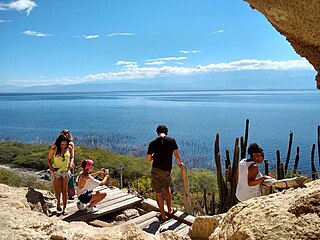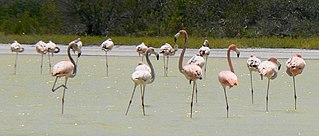
The Dominican Republic is a country on the island of Hispaniola in the Greater Antilles archipelago of the Caribbean Sea, bordered by the Atlantic Ocean to the north. It occupies the eastern five-eighths of the island, which it shares with Haiti, making Hispaniola one of only two Caribbean islands, along with Saint Martin, that is shared by two sovereign states. It is the second-largest nation in the Antilles by area at 48,671 square kilometers (18,792 sq mi), and second-largest by population, with approximately 11.4 million people in 2024, of whom approximately 3.6 million live in the metropolitan area of Santo Domingo, the capital city.

The Dominican Republic is a country in the West Indies that occupies the eastern five-eighths of Hispaniola. It has an area of 48,670 km2, including offshore islands. The land border shared with Haiti, which occupies the western three-eighths of the island, is 376 km long. The maximum length, east to west, is 390 km from Punta de Agua to Las Lajas, on the border with Haiti. The maximum width, north to south, is 265 km from Cape Isabela to Cape Beata. The capital, Santo Domingo, is located on the south coast.

Baoruco, alternatively spelt Bahoruco, is a province of the Dominican Republic located in the southwest of the country, part of the Enriquillo Region, along with the provinces of Barahona, Independencia and Pedernales. Before 1952 it included what is now Independencia Province.

Pedernales is the southernmost province of the Dominican Republic, including the offshore island of Isla Beata. It was split from Barahona in 1957. Of its 2,074.53 km2, 1,374 km2 belongs to the Jaragua National Park. A third of its population is of Haitian origin, the highest ratio within the country.

Lake Enriquillo is a hypersaline lake in the Dominican Republic located in the southwestern region of the country. Its waters are shared between the provinces of Bahoruco and Independencia, the latter of which borders Haiti. Lake Enriquillo is the largest lake in both the Dominican Republic and Hispaniola, as well as the entire Caribbean. It is also the lowest point for an island country.

Enriquillo, also known as "Enrique" by the Spaniards, was a Taíno cacique who rebelled against the Spaniards between 1519 and 1533. Enriquillo's rebellion is the best known rebellion of the early Caribbean period. He was born on the shores of Lake Jaragua and was part of the royal family of Jaragua. Enriquillo's aunt Anacaona was Queen of Jaragua, and his father Magiocatex was the crown prince. He is considered a hero in the modern day Dominican Republic for his resistance in favor of the indigenous peoples. Dominican friar Bartolomé de las Casas, who documented and rallied against Spanish abuse of the native peoples, wrote sympathetically of Enriquillo.

Sphaerodactylus ariasae, commonly called the Jaragua sphaero or the Jaragua dwarf gecko, is the smallest species of lizard in the family Sphaerodactylidae.

Jaragua National Park is a Dominican national park located in Pedernales Province, in the extreme southwest of the Dominican Republic. Jaragua has a total area of 1,374 km², the largest such protected area in the Caribbean.

The rhinoceros iguana is an endangered species of iguana that is endemic to the Caribbean island of Hispaniola and its surrounding islands. A large lizard, they vary in length from 60 to 136 centimetres, and skin colours range from a steely grey to a dark green and even brown. Their name derives from the bony-plated pseudo-horn or outgrowth which resembles the horn of a rhinoceros on the iguana's snout. It is known to coexist with the Ricord's iguana ; the two species are the only taxa of rock iguana to do so.

Cyclura ricordii, also known as Ricord's ground iguana or Ricord's rock iguana, is an endangered species of medium-sized rock iguana, a large herbivorous lizard. It is endemic to the island of Hispaniola. It is known to coexist with the nominate subspecies of the rhinoceros iguana ; the two species are the only taxa of rock iguana to do so. The natural habitats of its three subpopulations are hot, dry, wooded savanna on limestone with access to soil and sandy flats in southern Hispaniola. It is threatened by predation by introduced predators and habitat loss, due to overgrazing and charcoal manufacture.

Bohechío is a town in the San Juan province of the Dominican Republic. It is located northeast of the km 25 of Azua – San Juan road at a distance of 26.5 km and 43 km from San Juan Province, 205 km from Santo Domingo and 92 km of the Province Azua, nestled between mountains at the foot of the Cordillera Central. It has a land area of 428.33 km2.

Beata Island is a small island on the Caribbean Sea, located 7 km (4 mi) southwest from Cape Beata. Some 12 km (7 mi) southwest of it lies the smaller Alto Velo Island. It is politically part of the Dominican Republic, and is roughly triangle-shaped and fairly flat, with an approximate area of 27 km2 (10 sq mi).

The following is an alphabetical list of topics related to the Dominican Republic.
Alto Velo Island is a small uninhabited island south of the island of Hispaniola in the Caribbean Sea. Its maximum height is about 152 metres (499 ft) above sea level. It lies on an underwater mountain range which continues to Beata Island and the southwestern coast of the Dominican Republic. It has an area of 1.02 km2 (0.39 sq mi) and is 1.4 km (0.87 mi) long, being oval in shape.

The Dominican city of Pedernales is the capital of the Pedernales Province, in the Dominican Republic. It is located in the southwest of the country, on the Dominican Republic–Haiti border, and has a crossing to the Haitian town of Anse-à-Pitres.
Jaraguá or Jaragua may refer to:

The chiefdoms of Hispaniola were the primary political units employed by the Taíno inhabitants of Hispaniola in the early historical era. At the time of European contact in 1492, the island was divided into five chiefdoms or cacicazgos, each headed by a cacique or paramount chief. Below him were lesser caciques presiding over villages or districts and nitaínos, an elite class in Taíno society.

The Sierra de Bahoruco National Park is an environmentally protected national park located in the South-western region of Dominican Republic. It was created in 1983 by Presidential Decree during the presidency of Salvador Jorge Blanco.

The Hispaniolan dry forests are a tropical dry broadleaf forest ecoregion on the island of Hispaniola. They cover 15,123 km2 (5,839 sq mi), around 20% of the island's area.














